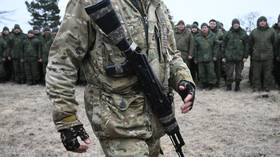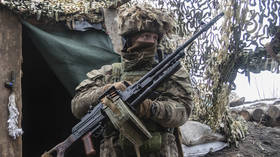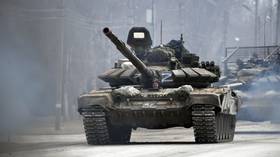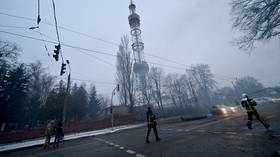DPR fighter explains how he came to be supporting the people of the Donbass
Sun 8:53 pm +01:00, 13 Mar 2022https://www.rt.com/russia/551211-dpr-militant-ukraine-interview/
‘We will never go back to Ukraine’: DPR fighter jailed for his views by Kiev talks to RT

With the military operation taking place in Ukraine, some might ask – how will the locals react? Eight years ago, the general consensus was that the southern and eastern regions were pro-Russian, but then the Kiev regime started to brutally repress activists who wanted closer ties with Moscow. An aggressive war propaganda campaign was launched targeting Russia.
RT spoke about this with Vladislav Dolgoshey, an activist from Odessa who spent four years in jail after being charged with “pro-Russian subversive activities” without any proof. In 2019, he was released as part of a prisoner exchange. After this interview, Vladislav went to the frontline as a volunteer and joined the People’s Militia of the Donetsk People’s Republic.
— What was your path to your pro-Russian political views?
I wouldn’t call my political views pro-Russian, they are just Russian. You have pro-Russian views when your position on certain issues reflects that of Russia as a state. I consider myself Russian – ethnically, spiritually, nationally. Yes, I was born in a different country, foreign to Russia, but that’s just my circumstances.
My views were shaped by my surroundings. Odessa is still the most Russian city in Ukraine. The Russian language is absolutely predominant, and even Ukrainian nationalists complain that when a Ukrainian comes to Odessa, they start speaking Russian. And the residents are very protective of their Odessa identity. That facilitates assimilation.
My upbringing also played its part. My father was a pro-Russian politician, but, to his credit, he never imposed any of his views on me, just recommended reading books. I read books written by Ukrainian, Polish, and Russian historians.
— How did the Russian movement in Odessa react to the Euromaidan events?
The situation wasn’t great for us in 2014. President Yanukovych didn’t like the Russian movement very much, and this was his attitude to both nationalists and Orthodox activists. Despite this, more and more people joined our events every year. And these were very diverse groups – nationalists, Orthodox Christians, leftists, all united by one idea – their Russian identity.
Our reaction to the Euromaidan events was negative from the very beginning. First of all, we knew who was behind it. We understood which side Euromaidan turned to and knew for a fact that the West was not the political community we wanted to belong to.
We began to form militia units in February, but we were too late. Maidan had already happened, it had its hit squads and money. We acted fast, like in that saying about Russians taking their time to prepare for something but then moving fast. But we still were unprepared for what was to come. Russians are kind people. We had no idea something like the tragic events of May 2 could really happen. (Ukrainian nationalists murdered 50 pro-Russian demonstrators in the Trade Unions House during the protests. Vladimir Putin promised to find and punish the perpetrators in his 21st February speech — RT.)
The leaders kept saying that it was a peaceful protest, just people defending their rights and fighting for democracy. But once the West comes, there can be no democracy. All pro-Western revolutions were not about democracy – their goal was to create a corrupt system of colonial control. Democracy is something the West wants only for itself. And the West turned Ukraine into an unstable structure vulnerable to outside influence.
— What’s changed after the May 2 tragedy?
There were some legal political activities allowed by the Kiev regime. They were carried out by old people with Communist and religious views. But Ukrainian radicals had the nerve to attack even these grandmas and grandpas. Many healthy strong men went to the frontline, to the Donbass. Of course, not everybody made it. 100-150 inmates would be incarcerated in the Odessa jail at a time – these people were arrested as they tried to make their way to the Donbass.
There were also underground groups operating in Odessa and the Odessa Region. The indictment against me – and I would like to stress that the charges have never been proven – said that the allegedly sabotage unit under my command perpetrated terrorist attacks and sabotage activities across several regions in the southeast of Ukraine. The underground movement existed for around 18 months, engaged in this invisible struggle. Trust me when I say that 18 months is a really long time for an underground movement with no experience, no bases and no resources.
— Why have there been no tragedies comparable to the Odessa one in other cities across the southeastern part of the country?
You have to understand that Odessa was a stronghold of the pro-Russian sentiment in Ukraine. We’ve always been very vocal about it, and even now our people are not happy about the Ukrainian government. There are rumors that the current mayor of Odessa, Gennady Trukhanov, has a Russian passport and actually holds pro-Russian views. I don’t think these rumors are true, even though Trukhanov did make a speech at Kulikovo Pole Square not long before May 2 happened. So, in this period, between the Euromaidan winning and the tragedy, he was on our side. Then he made a U-turn, which is pretty typical of politicians.
Moreover, not many people know that they used force to crush pro-Russian movements in other Ukrainian cities as well. Take Zhitomir. Nothing like May 2 happened there, of course, but Zhitomir is not Odessa – it’s closer to the western part of the country. It was bad in Kharkov, and in Nikolayev they burned a makeshift camp. But it wasn’t on camera and the media didn’t cover it, though it was a real struggle, a street war and there were casualties.
To give you a better idea of what was happening, I can tell you that one Euromaidan supporter who later became part of the Azov Battalion (forbidden in the Russian Federation) claimed that even the war was less scary than Kharkov in 2014. You never knew what direction you could be hit from, you were always on the lookout for a sneak attack. It was the same in Odessa. We had a literal war in the streets, with cars and houses set on fire. People were being killed, some went missing. That was the civil war – it was back then.
— So why did the ideas of the ‘Russian Spring’ fail to triumph in most of the Ukrainian southeast in 2014?
They didn’t fail in 2014. The ‘Russian spring’ ended in 2015, after Minsk II. Until then, even though there were no military hostilities and no frontlines, hundreds and thousands of people were politically active and involved in the underground movement in Odessa and other places. It’s obvious if you look at the sheer number of political prisoners in Ukraine that were later swapped for POWs.
Why did the frontlines end up being in Donetsk and not in Odessa or Nikolayev? Easy – it’s all about the location. Luckily for Donetsk, Russia can supply it with water, energy and humanitarian aid. Volunteers also had no trouble getting there. This was not the case for Odessa. Yes, we’re close to the pro-Russian Transnistria, but it lacked the resources to support the Odessa Region. The local militia wouldn’t have stood a chance.
Still, a fulltime rebellion could’ve gone ahead. We stormed and seized the regional authorities building after all – the same as in Donetsk and Lugansk. But our ‘wise’ politicians – who are pro-Russian, but not Russian – told us to leave and refrain from storming the SBU HQ and avoid provocations. I won’t comment on how pro-Russian I personally think they are.
So let’s imagine Odessa had followed in Donetsk’s footsteps. The Odessa region would have been cut off and left without water or energy supply. It would be simply impossible to resolve these problems. That’s the reason the rebellion didn’t happen, even though an attempt was made. That’s why some Odessa residents went to Crimea when the Crimean Spring began, then on to the Donbass. They went wherever there was armed resistance. They wanted to fight. Not everyone is suited to stealthy underground activities.
— Many Russian-speaking residents of Ukraine’s southeast (primarily, siloviki – law enforcement and security officers) supported the Euromaidan. Is it possible that they did not see the threat?
Ukrainian siloviki are public servants. They are completely devoid of personal political opinions. They talk about their love of Russia when sitting in their own kitchen, drinking vodka with friends. And, by the way, we have seen some of these people, Ukrainian siloviki, arrested, imprisoned, and discharged from service for the things they had said in their homes. But most of them were simply not interested in politics. They didn’t care who was in power. And they realized that nothing would change for most of them – they would be treated by the state the same as before. And they were right – just a year later the Ukrainian siloviki were suppressing a new Maidan protest.
— Are the Donbass republics really determined to fight for the choice they made back in 2014 till the last?
I believe that the people of the Donbass are absolutely determined to do that. For eight years, we have lived expecting war to break out at any moment. Some people might be expecting peace, perhaps, or the implementation of the Minsk Accords. But the majority have been expecting war, which would settle the Ukrainian issue once and for all. When people in Donetsk say that there will be a war, they usually say it with a smile. They are not afraid, there is no panic. War has been there for eight years already and they don’t care if it intensifies a little (or even more than a little). These people are firm in their belief that reunification with Russia is their ultimate historic mission and they will pull through.
— How do you think the Russian Armed Forces or pro-Russian militias will be met in the southeastern regions of Ukraine and Odessa?
Let me tell you a historical anecdote dating back to the time of the Russian Civil War. When the allied troops of the Triple Entente withdrew from Odessa, local residents greeted both the Whites and the Reds with flowers. You see, the people of Odessa are part of the Russian nation – they have Russian roots in them. I am absolutely certain that the local population will greet any Russian troops with flowers. Moreover, I am sure that the men of the Donbass will voice their support by sabotaging the SBU, by launching attacks in the enemy rear. And this would be appreciated the most.
— Is a pro-Russian political movement possible in an independent Ukraine?
No way. All the opinion leaders and those who spearheaded the Russian uprising in 2014 are either dead or in Donetsk and Russia. There are no pro-Russian political forces left in Ukraine, either. However, prior to 2014, we used to have the Russian Bloc in Crimea and the Rodina party in Odessa. There are still some local, decentralized political groups, of course. But the Ukrainian authorities will never allow any big-scale political movement.
— We have seen a massive crackdown on pro-Russian activists, as well as Ukrainization efforts in the southeastern regions of Ukraine over the past eight years. Can we even talk about the Russian national identity left in those parts of Ukraine?
You see, the overwhelming majority of today’s residents of Ukraine and Russia, or at least their parents, were born in the Soviet Union. And you are aware that Russian national identity was never displayed in that country. Moreover, the USSR would never compete against modern Ukraine in terms of propaganda effectiveness and imposing political views on its citizens. But the Russian national identity has survived despite all this.
Russian people will always remain Russian. There will be traitors, of course. There always are. But the majority of people, the salt of the earth, will remain Russian, no matter how much Ukrainian propaganda is poured down on them. Unfortunately, in today’s Ukraine, you can only be Russian until the state takes notice of you.
— Has there ever been a chance of Ukraine fulfilling the Minsk Agreements?
There have been two grave mistakes in the history of the two republics. The first one was made in 2015, when Ukraine made it abundantly clear that it was not going to stick to the Minsk Accords. That’s when we should have struck. The Minsk Accords effectively served as an act of Ukraine’s capitulation. It is such a pity that we missed that opportunity to press on. The second mistake was to believe that Ukraine would ever agree to a peace treaty with the Donbass. The West would never stop nudging Ukraine towards war.
And from the Donbass’ viewpoint, I can assure you that no one there will ever ask to be taken back by Ukraine. It’s not for that that the blood and sweat of the Donbass people have been shed for eight years in attempts to defend their choice. Perhaps, some people would have agreed to that eight years ago, but not now. We have a different mentality, you see, but there used to be a bond tying us to that country. A bond that has been severed.





